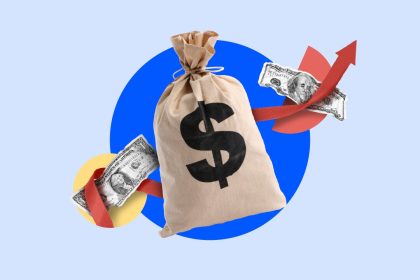Key takeaways
- A debt consolidation loan is primarily meant to save money on interest by securing a lower APR and a shorter payoff timeline.
- Bad credit debt consolidation loans may not be as effective due to the higher interest rates.
- Improve your chances of getting a good deal by checking your credit report for errors, raising your score, shopping around and looking into secured options.
Debt consolidation is a debt management strategy that allows you to combine multiple debts into a single account. One of the most common ways to consolidate debt is to use a debt consolidation loan — a personal loan used to pay off multiple creditors.
Debt consolidation loans can make it easier for you to get out of debt, as you’ll only have to worry about managing one account, potentially with a lower interest rate. Although it may be tough to get this type of loan with bad credit, there are several actions you can take to increase your loan approval odds.
How to get a debt consolidation loan with bad credit
If you’re struggling to get out of debt and think a debt consolidation loan can help, but have poor credit — a FICO score of under 580 — consider following these steps to find the right debt consolidation loan for your situation.
1. Check and monitor your credit score
Lenders base loan decisions largely upon the condition of your credit. Generally, the lower your credit score, the higher the interest rates lenders will offer you on financing.
Many banks offer free tools that allow you to check and monitor your credit score. Once you know your credit score, it’s easier to identify lenders that may be willing to work with you. There are lenders specializing in bad credit loans, and many list credit score requirements on their websites, which can help narrow down your choices.
Bankrate tip
Check with your bank or credit card issuer to see if it offers tools that allow you to see your credit score for free.
2. Shop around
It’s rarely a good idea to accept the first loan offer you see. Instead, do your research and compare loan amounts, repayment terms and fees from multiple sources. You can find these loans at local banks, credit unions and online lenders. This process can take time, but it might save you hundreds, if not thousands, of dollars.
Bankrate tip
Compare your loan options from multiple lenders to find the best debt consolidation loan for your needs. Go to each lender’s website to learn about its products and qualification requirements.
3. Consider a co-signer, joint loan or a secured loan
If you’re having a hard time qualifying for a regular debt consolidation loan, it might be worth taking out a secured loan or asking a creditworthy friend or family member to co-sign or apply as a co-applicant.
- Co-signed loans. Co-signers share legal responsibility for the loan, but not ownership. Signing the loan documents with a creditworthy family member or friend can both increase your approval odds and lower your interest rate.
- Joint loans. Joint applicants (also called co-borrowers or co-applicants) take on the debt with the primary borrower and have joint ownership of the balance.
- Secured loans. These loans require some form of collateral, such as a vehicle, home or another asset. If you default, the lender will seize the collateral to recoup its funds. Because of this, getting approved for a secured loan is typically easier than an unsecured one, and you may even qualify for a better interest rate.
Bankrate tip
To increase your loan approval odds and chances of landing a lower rate, use a co-signer or co-applicant or shop around for a secured personal loan.
Where to get a debt consolidation loan for bad credit
With so many lenders out there, it can be overwhelming trying to decide where to begin. Here are some good places to start your search when choosing the right debt consolidation lender.
Credit unions and local banks
If you’re a local bank customer or a credit union member, you can talk to a loan officer about whether you qualify for a personal loan — and what the rate and terms are if you do. The institution may look beyond your low credit score and consider your entire financial history, personal circumstances and relationship you have with them to approve you for the loan.
Online lenders
Online lenders are good places to look for debt consolidation loans if you have bad credit. They offer bad-credit loans and generally have more flexible eligibility criteria than a traditional bank. However, online lenders typically charge high APRs and origination fees for bad-credit debt consolidation loans.
Three best bad-credit lenders for debt consolidation
| Lender | Best for | Est. APR | Loan amount | Loan term | Min. credit score |
|---|---|---|---|---|---|
| Avant | Consolidating a small amount of debt | 9.95% to 35.99% | $2,000 to $35,000 | 1-5 years | 550 |
| Best Egg | Direct to creditor funding option | 8.99% to 35.99% | $2,000 to $50,000 | 3-5 years | 600 |
| Upstart | Consumers with little credit history | 7.80% to 35.99% | $1,000 to $50,000 | 3 or 5 years | No requirement |
-
Avant is best if you need to consolidate a small to midsize debt load. The maximum amount you can borrow is $35,000 — the lowest on our list of debt consolidation loans for bad credit. If approved, you could receive funds as fast as the next day. Plus, Avant allows you to manage your loan via its mobile app.
Avant is best if you need to consolidate a small to midsize debt load. The maximum amount you can borrow is $35,000 — the lowest on our list of debt consolidation loans for bad credit. If approved, you could receive funds as fast as the next day. Plus, Avant allows you to manage your loan via its mobile app.
-
Pros
- Quick funding.
- Mobile app.
- No prepayment fee.
Cons
- High maximum rates.
- Administration fee up to 9.99 percent.
- Lower maximum loan amount.
Pros
- Quick funding.
- Mobile app.
- No prepayment fee.
Cons
- High maximum rates.
- Administration fee up to 9.99 percent.
- Lower maximum loan amount.
-
Best Egg can send funds directly to your creditors, which streamlines the debt consolidation process. Although most of its personal loan amounts typically top out at $35,000, you may be able to borrow up to $50,000 with a special offer code — depending on your state of residence. Once approved, you can receive funds as early as the next business day.
Best Egg can send funds directly to your creditors, which streamlines the debt consolidation process. Although most of its personal loan amounts typically top out at $35,000, you may be able to borrow up to $50,000 with a special offer code — depending on your state of residence. Once approved, you can receive funds as early as the next business day.
-
Pros
- Direct payment to creditors.
- Option to prequalify.
- No prepayment penalty.
Cons
- Origination fee up to 8.99 percent.
- High maximum rates.
- No autopay discounts.
Pros
- Direct payment to creditors.
- Option to prequalify.
- No prepayment penalty.
Cons
- Origination fee up to 8.99 percent.
- High maximum rates.
- No autopay discounts.
-
Upstart might be a good choice if you have a thin credit profile — you don’t necessarily need a credit score to qualify. The lender uses an untraditional approval model, looking at factors outside of your credit, like your education and employment. It claims that this model is why its loans have 36 percent lower rates than lenders that apply a traditional model.
Upstart might be a good choice if you have a thin credit profile — you don’t necessarily need a credit score to qualify. The lender uses an untraditional approval model, looking at factors outside of your credit, like your education and employment. It claims that this model is why its loans have 36 percent lower rates than lenders that apply a traditional model.
-
Pros
- Considers nontraditional factors.
- High loan amount.
- Fast funding.
Cons
- Origination fee up to 12 percent.
- No joint or co-signer option.
- Limited repayment terms.
Pros
- Considers nontraditional factors.
- High loan amount.
- Fast funding.
Cons
- Origination fee up to 12 percent.
- No joint or co-signer option.
- Limited repayment terms.
How to qualify for a debt consolidation loan
Every lender sets its requirements for borrowers looking for debt consolidation loans. That said, these are some of the most common requirements you’ll need to meet to get approved for the loan:
- Be a U.S. citizen or a permanent resident.
- Be at least 18 years old.
- Not be involved in a bankruptcy or foreclosure proceeding.
- Have a debt-to-income (DTI) ratio below 45 percent.
- Have a credit score in the mid-600s.
Although some lenders may still approve you for a loan even if your credit score is below the mid-600s threshold and your DTI is on the higher side, you’ll probably end up paying more in interest and fees. If that happens, it may not be worth it for you to apply for a debt consolidation loan, as you likely won’t be able to save money.
What credit score do you need for a consolidation loan?
Each lender carries its own requirements but credit score minimums tend to fall in the mid-600s.
When is a debt consolidation loan a good idea?
A debt consolidation loan may be right for you if you resonate with most of the following statements:
- I’ve prequalified with a lender that offers a lower rate than my existing rates.
- I have multiple streams of high-interest debt that I’m having trouble keeping track of.
- I have a co-signer or co-borrower on-hand and the income necessary to make the monthly payments.
- I’m not planning to take on more debt until my consolidation loan is paid off in full.
- My spending habits aren’t the reason I have high-interest debt (or they’ve been addressed and corrected).
- I have a solid emergency fund that I won’t need to dip into for the monthly payments.
Bankrate tip
To increase your chances of receiving a lower rate, take these steps to improve your credit score before applying: Pay your debt on time, pay off as much credit card debt as possible and review your credit reports for errors.
Alternatives to a debt consolidation loan
If you can’t qualify for a debt consolidation loan with a lower interest rate than you’re currently paying, you might want to consider some of these alternatives instead.
- Do-it-yourself approach. Altering your financial plan without third-party help takes dedication and time, but it is possible. Options include overhauling your budget, renegotiating your debt and asking for an adjusted due date.
- Debt management plan. A debt management plan (DMP) is a type of debt consolidation. You make monthly payments to a credit counseling agency to cover multiple monthly costs, and the agency negotiates with your creditors. Most plans take three to five years to complete.
- Home equity. If you own a home with significant equity, you may be able to take out a loan, line of credit or refinance to consolidate your debt. Before taking out a home equity loan, consider the fact that your house is at risk if you default on payments.
- Credit counseling. A credit counseling agency can help by acting as an intermediary between you and your creditors. A credit counselor can help you understand your credit report and suggest steps for improving your credit score and achieving financial stability.
- Debt settlement. Debt settlement companies work with you to settle your debt for less than what you owe for a fee. The caveat is that you typically need to pay enough into an account with the debt settlement company before it will begin negotiations with your creditors — often at the expense of forcing you to default.
- Bankruptcy. If you’re experiencing financial hardship and even debt settlement doesn’t sound possible, bankruptcy may be your only option. Depending on the type of bankruptcy you file, you may need to place your assets under control of a bankruptcy court and agree to give up most or all of your wealth.
Watch out for predatory lenders
Predatory loans are those that benefit the lender at the borrower’s expense. Predatory lenders are rather common in the bad credit space, as these companies take advantage of borrowers’ limited ability to secure a loan through the conventional route to push risky credit products on them. The warning signs include:
- Triple-digit interest rates and equally exorbitant fees.
- Pressure to act quickly.
- The lender asks you to lie on your application.
- The fees or terms suddenly change at closing.
Accepting such a loan can be extremely expensive and may cause you to go deeper into debt. Plus, using a predatory lender defeats the purpose of a debt consolidation loan, which is to make it easier for you to get out of debt, as you’ll have a harder time keeping up with the higher payments.
Read the full article here

















